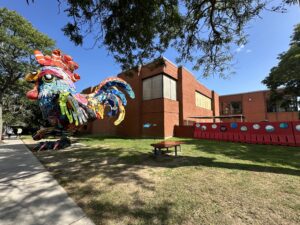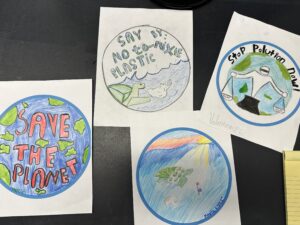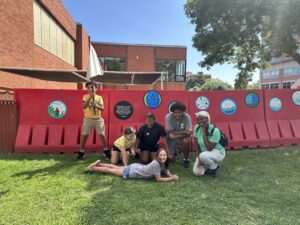
This past summer, 32 enthusiastic young artists from the New Bedford YMCA Summer Camp participated in a dynamic workshop series hosted by DATMA, blending creativity with environmental awareness. In partnership with Mass Audubon, the program introduced campers, ages 8-12, to the world of public art while offering them the opportunity to make a lasting contribution to their city.
The workshop centered around Bordalo II’s monumental Plastic Rooster, a striking public art piece that uses discarded materials to convey a powerful message about plastic pollution. Bordalo II, known for his “Trash Art,” reimagines waste like old tires and car parts into animal sculptures, showcasing the destructive impact of human behavior on wildlife. The Plastic Rooster is one such creation, highlighting the importance of sustainability while standing tall in New Bedford as a symbol of environmental action.
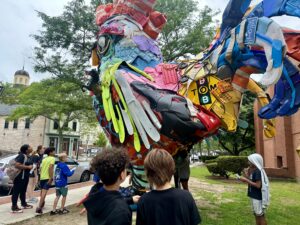
Learning by Creating
Over six engaging sessions between July and August 2024, the YMCA campers were introduced to the engineering behind Bordalo II’s work, as well as the environmental issues it addresses. Guided by Amanda Hawkins, DATMA’s Programs & Education Manager, and Abby Abrahamson, Education Specialist from Mass Audubon and the YMCA, the young participants dove deep into the intersection of art and environmental science.
The workshops emphasized STEAM learning, encouraging campers to respond creatively to real-world problems like plastic pollution. After learning about the materials and techniques behind the Plastic Rooster, students sketched their own designs inspired by the sculpture’s message. These designs were transformed into vibrant vinyl decals and proudly displayed alongside the Plastic Rooster, creating a new layer of community involvement in the city’s art landscape.
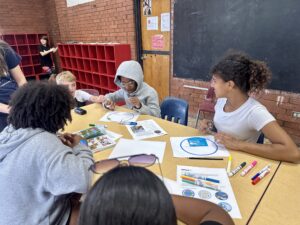
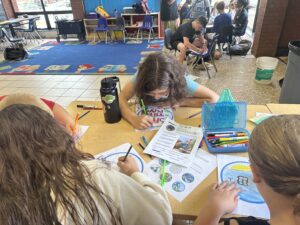
Impacting Community and Environment
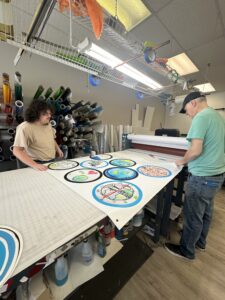 By participating in this hands-on public art project, the campers gained a unique understanding of the power of art to inspire change. They didn’t just learn about environmental issues—they created tangible responses to them, contributing to a larger conversation about sustainability in their community. This experience empowered the youth to realize that their voices, no matter how small, could have a lasting impact on their city and the world.
By participating in this hands-on public art project, the campers gained a unique understanding of the power of art to inspire change. They didn’t just learn about environmental issues—they created tangible responses to them, contributing to a larger conversation about sustainability in their community. This experience empowered the youth to realize that their voices, no matter how small, could have a lasting impact on their city and the world.
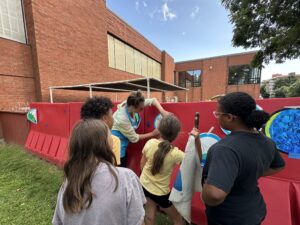 The students walked away from the workshop with more than just art skills. They honed their abilities in critical thinking, collaboration, and communication—valuable 21st-century skills that will serve them well in school and beyond. Most importantly, the young artists deepened their connection to their city by leaving a mark on New Bedford’s public art scene, inspiring conversations about plastic pollution and sustainable living among locals and visitors alike.
The students walked away from the workshop with more than just art skills. They honed their abilities in critical thinking, collaboration, and communication—valuable 21st-century skills that will serve them well in school and beyond. Most importantly, the young artists deepened their connection to their city by leaving a mark on New Bedford’s public art scene, inspiring conversations about plastic pollution and sustainable living among locals and visitors alike.
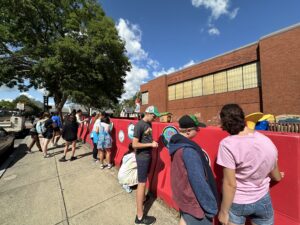
Blending Art, Science, and Community
This workshop series exemplified DATMA’s commitment to fostering creativity, environmental responsibility, and community engagement. Through partnerships with the YMCA and Mass Audubon, these workshops brought to life the idea that art can be a powerful tool for education and environmental action.
In the end, the campers not only gained real-world experience in public art creation but also contributed to a project that will leave a lasting visual impact on their community. The Plastic Rooster—with its vibrant decals designed by the campers—stands as a testament to the potential of young artists to shape a more sustainable future.
